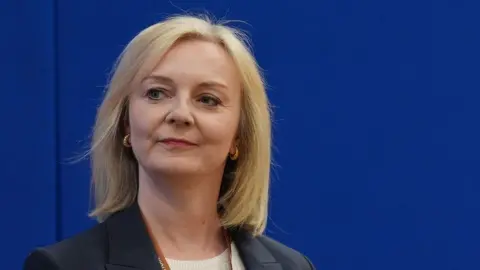In a significant political move, the Conservative Party has distanced itself from the controversial mini-budget introduced by former Prime Minister Liz Truss, which had previously destabilized the UK economy during her brief tenure. Mel Stride, the shadow chancellor, articulated an unequivocal rejection of Truss’s £45 billion tax cut strategy, stating emphatically that the party would “never again” jeopardize the UK’s economic stability with “promises we cannot afford.” This disavowal comes as a strategic effort to regain credibility after the turmoil that followed Truss’s fiscal policies, which resulted in her resignation just 49 days into office.
In a speech, Stride reflected on the repercussions of Truss’s mini-budget, acknowledging that while mistakes were recognized, the damage to the party’s credibility would be more challenging to undo. His remarks highlighted the extent of the fallout from the economic plan delivered in September 2022 by then-Chancellor Kwasi Kwarteng, which included substantial tax cuts and energy bill subsidies. These proposals were met with immediate backlash from financial markets, leading to a rise in mortgage rates and a depreciation of the pound’s value, ultimately contributing to Truss’s downfall.
Truss, in response to Stride’s repudiation, defended her policies, claiming that they were designed to “turbocharge the economy.” She criticized Stride for adhering to what she termed “failed Treasury Orthodoxy,” implying that his conservative approach failed to consider innovative economic growth strategies. Truss accused her former colleague of being overly compliant with existing bureaucratic systems during their shared time in government.
The mini-budget, which had been crafted to boost the UK economy following the pandemic, unwittingly triggered widespread economic unease. Following its introduction, Truss’s administration faced escalating public and financial system discontent, leading to her decision to step down. Her immediate successor, Rishi Sunak, had previously voiced concerns regarding the unsustainable funding of tax cuts through borrowing.
In 2023, the Labour party leveraged this economic chaos as a campaigning tool, consistently citing the mini-budget as evidence of the Conservative’s mismanagement. Stride’s recent comments underscore a critical shift within the Conservative Party as it wrestles to reclaim the trust of the electorate. He remarked that the decisions around the mini-budget had threatened the stability that had long been a hallmark of Conservative governance, admitting that the party had allowed itself to put the UK’s economic framework at risk.
As the political landscape shifts, Stride’s assertion that the party would never again propose unaffordable promises reflects a broader strategy to reassure voters of fiscal responsibility and economic prudence. He stressed the importance of honesty in rebuilding trust with the electorate, indicating a need for transparency about past errors.
Meanwhile, Liz Truss fiercely defended her policies, claiming that her approach was the most viable pathway to avoiding a significant electoral defeat in the following general election. She pointed a finger at Stride and his contemporaries within the party, accusing them of supporting policies that ultimately led to high taxes and unfunded commitments.
On another front, Stride also targeted Reform UK’s economic proposals, led by Nigel Farage, which he characterized as “pure populism” echoing past missteps associated with Jeremy Corbyn and Labour’s fiscal policies. The Deputy Leader of Reform UK, Richard Tice, retorted by accusing Stride’s party of having presided over soaring government spending and plummeting economic growth during its term in power.
In essence, the Conservative Party’s disavowal of Truss’s mini-budget signifies a pivotal moment as it endeavors to redefine its economic strategy and mend its reputation with the British public. As both internal party dynamics and external political pressures evolve, Stride’s statements and the reactions from Truss and opposing parties underscore the ongoing debates over economic policies, fiscal responsibility, and accountability that will likely shape the political discourse leading up to future elections.



